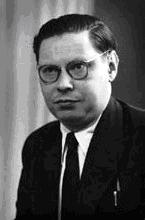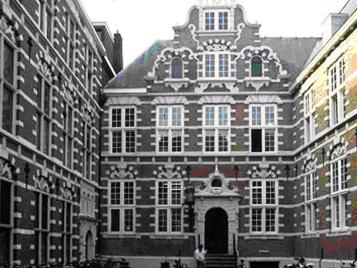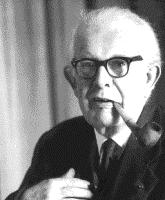 The website is in construction. New files will be uploaded as soon as they are available.
The website is in construction. New files will be uploaded as soon as they are available.
EVERT W. BETH
Almelo, 1908 - Amsterdam, 1964

- Brief scientific biography
- Quotations relevant to mathematics education
- Primary bibliography
- Secondary bibliography
Brief scientific biography
Evert Willem Beth was born in Almelo (eastern Netherlands, near the Dutch-German border) on 7 July 1908 (so in 2008 we can mark his centenary birth anniversary). His father, H.J.E. Beth, had studied mathematics and physics at Amsterdam University and worked as teacher in mathematics and physics in secondary schools (VAN ULSEN, 2000); Evert studied mathematics and physics at Utrecht University, and also studied both philosophy and psychology. His 1935 Ph.D. was in philosophy (Faculty of Arts).

Amsterdam University
In 1946, Beth became professor of Logic and Foundations of Mathematics in Amsterdam (more precisely, in 1946 he was appointed to a part-time professorship; in 1948 this became a full professorship; it is worth noting that he was the first professor of Logic and Foundations of Mathematics in the Netherlands). Apart from two brief interruptions (in 1952 he worked as a Research Associate at the University of California in Berkeley, with A. Tarski, and in 1957-1958 he taught as a Visiting Professor at Johns Hopkins University in Baltimore), Beth worked in Amsterdam continuously until his death (HEYTING, 1966).
Beth was a mathematician, logician and philosopher whose work principally concerned the foundations of mathematics. His name is often remembered with reference to semantic tableaux: the tableau method was devised independently by Beth (1955), Hintikka (1955) and Schütte (1956) and later developed by Smullyan (1968). Essentially, this important method is dual to Gentzen's natural deduction (1934) and it is considered by many to be intuitively simple, particularly for students not acquainted with the study of logic. In fact, Gentzen's method is a systematic search for proofs in tree form, while the tableau method is a systematic search for refutations in upside-down tree form. Beth himself underlined:
"At least three different methods of deduction are known today and are more or less currently applied in research: Hilbert-type deduction, Gentzen's natural deduction, and Gentzen's calculus of sequents. [...] In point of fact the three methods must rather be considered as different presentations of one and the same method" (Formal Methods, 1962, XII).
With the semantic tableaux, Beth explored different areas: classical logic, modal logic and intuitionistic logic; in combination with this method, Beth made a proof-theoretic variant: the deductive tableaux (HEYTING, 1966; VAN ULSEN, 2000). More generally, Beth's main contributions to logic were the definition theorem, semantic tableaux and the Beth models. The foundation of his work was Gentzen's extended Hauptsatz, the subformula theorem and Tarskian model theory. During the last period of his life (1960-1964), Beth tried to make his logical research subservient to a wide range of applications, e.g. the study of language, theorem proving, mathematical heuristics and translation methods in natural languages (VAN ULSEN, 2000).
Beth was the main founder of the Netherlands Society for Logic and Philosophy of Science, and he was also active in the organization of the International Association for Logic and Philosophy of Science (HEYTING, 1966). From the educational viewpoint it is worth highlighting the book published in 1955 entitled L'enseignement des mathématiques, by Beth, Choquet, Dieudonné, Lichnerowicz, Gattegno and Piaget: these Authors were the founders in 1950 of CIEAEM (Commission Internationale pour l'étude et l'Amélioration de l'Enseignement des Mathématiques) and organized many international meetings (for instance: 1950: Relations entre le programme mathématique des écoles secondaires et le développement des capacités de l'adolescent; 1951: L'enseignement de la géométrie dans les premières classes des écoles secondaires; 1951: Le programme fonctionnel: de l'école maternelle à l'université; 1952: structures mathématiques et structures mentales; 1953: les relations entre l'enseignement des mathématiques et les besoins de la science et de l'industrie; 1953: les rapports entre la pensée des élèves et l'enseignement des mathématiques; 1954: les mathématique modernes à l'école; 1955: l'élève face aux mathématiques. Une pédagogie qui libère).
Beth was a member of the Central Committee of the International Commission on the Teaching of Mathematics (ICMI) from 1952 to 1954. He did the greater part of the editorial work for the series "Studies in Logic and the Philosophy of Mathematics" founded at his initiative. Beth's merits were rewarded by his election in 1953 to the membership of the Royal Dutch Academy of Science and by a honorary doctorate in the University of Gent, conferred on him in 1964, when he was already too ill to travel to Gent in order to receive it (HEYTING, 1966).
Evert W. Beth died on 12 April 1964.
Quotations relevant to mathematics education
Beth approach to research in mathematics education was very interesting and profound; let us quote Jean Piaget:

Jean Piaget
"A logician friend of mine, the late Evert W. Beth [...] for a very long time [...] was a strong adversary of psychology in general and the introduction of psychological observations into the field of epistemology, and by that token an adversary of my own work, since my work was based on psychology. Nonetheless, in the interests of an intellectual confrontation, Beth did us the honour of coming to one of our symposia on genetic epistemology and looking more closely at the questions that were concerning us. At the end of the symposium he agreed to co-author with me, in spite of his fear of psychologists, a work that we called Mathematical and Psychological Epistemology.[...]. In his conclusion to this volume, Beth wrote as follows:
The problem of epistemology is to explain how real human thought is capable of producing scientific knowledge. In order to do that we must establish a certain coordination between logic and psychology. This declaration does not suggest that psychology ought to interfere directly in logic - that is of course not true - but it does maintain that in epistemology both logic and psychology should be taken into account, since it is important to deal with both the formal aspects and the empirical aspects of human knowledge" (PIAGET, 1970, 1),It is worth noting that Beth and Piaget gave an important contribution to research in cognitive development; in their book (BETH, PIAGET, 1961) they stated that the problems posed by formalisation can in some way correspond with current mental mechanisms. So the logico-mathematical structures leading to formalisation can be considered as the point of arrival of a long genetic process.
In the "Preface" to the book (1962) Formal Methods: an Introduction to Symbolic Logic and to the Study of Effective Operations in Arithmetic and Logic (Table of contents of this work: I. Purely implicational logic. II. Full sentential logic. III. Theory of quantification, equality, and functionality. IV. Completeness of elementary logic. V. The formalization of arithmetic and its limitations. VI. The theory of definition. VII. On machines which prove theorems), written in Amsterdam (October, 1961), Beth stated:
"Many philosophers have considered logical reasoning as an inborn ability of mankind and as a distinctive feature in the human mind; but we all know that the distribution of this capacity, or at any rate its development, is very unequal. Few people are able to set up a cogent argument; others are at least able to follow a logical argument and even to detect logical fallacies. Nevertheless, even among educated persons there are many who do not even attain this relatively modest level of development. According to my personal observations, lack of logical ability may be due to various circumstances. In the first place, I mention lack of general intelligence, insufficient power of concentration, and absence of formal education. Secondly, however, I have noticed that many people are unable, or sometimes rather unwilling, to argue ex hypothesi; such persons cannot, or will not, start from premises which they know or believe to be false or even from premises whose truth is not, in their opinion, sufficiently warranted. Or, if they agree to start from such premises, they sooner or later stray away from the argument into attempts first to settle the truth or falsehood of the premises. Presumably this attitude results either from lack of imagination or from undue moral rectitude. On the other hand, proficiency in logical reasoning is not in itself a guarantee for a clear theoretic insight into the principles and foundations of logic. Skill in logical argumentation is the result of congenital ability combined with practice; theoretic insight, however, can only arise from reflection and analysis" (p. X).A meaningful educational statement is the following:
"Lack of formal education can, of course, be remedied, but hardly by the study of logic alone" (p. X).Moreover:
"[The student] should become acquainted both with the semantic and with the purely formal approach to the notions, the problems, and the results of logical theory. A dogmatic attitude with respect to the different aspects of logic will easily result if the elements of logic are taught in a narrow spirit. [...] Each one-sided approach leaves part of the material more or less in the dark. [...] It should not be forgotten that later on it is extremely difficult to overcome the bad effects of a narrow-minded initiation" (p. XII).The importance of historical aspects was frequently underlined by Beth; for instance:
"Recent discussion on the foundations of mathematics and physical science cannot be fully understood without reference to their historical and philosophical background. These discussions for the greater part originate not merely from the results of contemporary scientific research in themselves, but rather from the incompatibility of these results with certain preconceived philosophical doctrines" (in: Critical Epochs in the Development of the Theory of Science, The British Journal for the Philosophy of Science, 1, 1, 27).
Primary bibliography
(A complete list of Beth's works was published by J.F. STAAL (1965))E.W. BETH 1935, Rede en aanschouwing in de wiskunde (Reason and intuition in mathematics), Dissertation, November 5 1935, Noordhoff, Groningen, Rijks Universiteit van Utrecht
E.W. BETH 1937, L'evidence intuitive dans les mathematiques modernes, Travaux du IXe Congres international de Philosophie, Paris, August 1-6 1937, VI, 161-165
E.W. BETH 1940, Inleiding tot de wijsbegeerte der wiskunde (Introduction to the philosophy of mathematics), Amsterdam, Standaard Boekhandel
E.W. BETH 1944, Geschiedenis der logica (History of logic), Servire's Encyclopaedie, Afd. Logica 37, 's-Gravenhage
E.W. BETH 1946-1947, Logical and psychological aspects in the consideration of language, Synthese, 5, 542-544
E.W. BETH 1950, Les fondements logiques des mathematiques, Paris and Louvain, Gauthier-Villars and Nauwelaerts
E.W. BETH 1950, Critical Epochs in the Development of the Theory of Science, The British Journal for the Philosophy of Science, 1, 1, 27-42
E.W. BETH 1951, Fundamental Features of Contemporary Theory of Science, The British Journal for the Philosophy of Science, 1, 4, 291-302
E.W. BETH 1953, Inleiding tot de wijsbegeerte der exacte wetenschappen (Introduction to the philosophy of science), Antwerpen, Standaard Boekhandel
E.W. BETH 1955, Remarks on natural deduction, Indagationes Mathematicae, 17, 322-325
E.W. BETH 1955, Semantic entailment and formal derivability, Mededelingen Koninklijke Nederlandse Akademie van Wetenschappen, Nieuwe Reeks, 18, 13, 309-342
J. PIAGET, E.W. BETH, J. DIEUDONNE, A. LICHNEROWICZ, V. CHOQUET, C. GATTEGNO 1955, L'enseignement des mathématiques, Paris, Delachaux et Niestlé
E.W. BETH, A. TARSKI 1956, Equilaterality as the only Primitive Notion of Euclidean Geometry, Indagationes mathematicae, 18, 462-467
E.W. BETH 1957, La crise de la raison et la logique, Paris and Louvain, Gauthier-Villars and Nauwelaerts
E.W. BETH, W. MAYS, J. PIAGET 1957, Epistémologie génétique et recherche psychologique, Paris, Presses Universitaires de France
E.W. BETH 1958, De weg der wetenschap (The course of science), Inleiding tot de methodologie der empirische wetenschappen (Introduction to the methodology of the empirical sciences), Haarlem, Bohn
E.W. BETH 1959, The foundations of mathematics. A study in the philosophy of sciences, Studies in Logic, Amsterdam, North Holland
E.W. BETH 1964, Door wetenschap tot wijsheid (Through science to wisdom), Assen, Van Gorcum
E.W. BETH 1965, Mathematical thought: an introduction to the philosophy of mathematics, Dordrecht, Reidel
E.W. BETH, J. PIAGET 1961, Epistemologie mathematique et psychologie, Paris, Presses Universitaires de France
E.W. BETH 1962, Les rapports entre langues formalisees et langue naturelle, in L. Beck (edited by), La philosophie analytique, Paris, Les Editions de Minuit, 248-261
E.W. BETH 1962, Formal methods. An introduction to symbolic logic and to the study of effective operations in arithmetic and logic, Dordrecht, Reidel
E.W. BETH, J.B. GRIZE, R. MARTIN, B. MATALON, A. NAEss, J. PIAGET 1962, Implication, formalisation et logique naturelle, Paris, Presses Universitaires de France
E.W. BETH 1963, The relationship between formalised languages and natural language, Synthese, 15, 1, 1-16
Secondary bibliography
J.L. DESTOUCHES (edited by) 1964, E.W. Beth Memorial Colloquium: Logic and Foundations of Science, Paris, Institut Henri Poincaré, May 19-21, Dordrecht, Reidel
V.H. DYSON, G. KREISEL 1961, Analysis of Beth's semantic construction of intuitionistic logic, Technical Report 3, Applied mathematics and statistical laboratories, Stanford, Stanford University (Contract No. DA-04-200-ORD-997)
M. FRANCHELLA 2002, Evert Willem Beth's Contributions to the Philosophy of Logic, Philosophical Writings, 21, 1-23
A. HEYTING 1966, Evert Willem Beth: in memoriam, Notre Dame Journal of Formal Logic, VII, 4, 289-295
D.H.J. DE JONGH, P. VAN ULSEN 1998, Beth's nonclassical valuations, Technical Report LP-1998-12, Institute for logic, language and computation, Universiteit van Amsterdam
J. PIAGET 1966, In memory of E.W. Beth (1908-1964). Mathematical epistemology and psychology, Dordrecht, Reidel, XI-XII
J. PIAGET 1970, Genetic epistemology, New York, Columbia University Press
J.F. STAAL 1965, E.W. Beth, 1908-1964, Dialectica, 19, 158-179
A.S. TROELSTRA, P. VAN ULSEN 1999, The Discovery of E.W. Beth's Semantics for Intuitionistic Logic, J. Gerbrandy et Al., JFAK, a collection of essays dedicated to Johan van Benthem on the occasion of his 50th birthday, http://www.illc.uva.nl/j50/contribs/troelstra/index.html
P. VAN ULSEN 2000, E.W. Beth als logicus, Proefschrift Universiteit van Amsterdam
P.J.M. VELTHUYS-BECHTHOLD 1995, Inventory of the papers of Evert Willem Beth (1908-1964), philosopher, logician and mathematician, 1920-1964 (c. 1980) , incorporating the finding-aid by J.C.A.P. Ribberink and P. van Ulsen, Haarlem, Inventarisreeks Rijksarchief in Noord-Holland
Author
Giorgio T. Bagni
Department of Mathematics and Computer Science
University of Udine - Italy
giorgio.bagni@dimi.uniud.it
